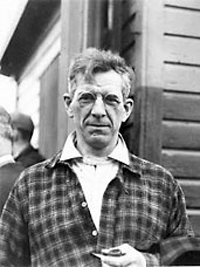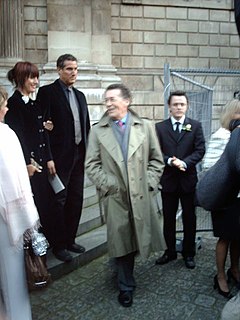A Quote by Charles Babbage
There is, however, another purpose to which academies contribute. When they consist of a limited number of persons, eminent for their knowledge, it becomes an object of ambition to be admitted on their list.
Related Quotes
My own doctrine of organization is that any body of people coming together for a purpose (whatever it may be) should consist of persons wholly wedded to said purpose and should consist of nobody else. If the purpose be Cannibalism (preference for Ham a la Capitalism) then nobody but a Cannibal should be admitted. There should be plenty of discussion and disagreement as to how and the means but none whatever as to ends.
...Only physicians are likely to be regarded as competent to judge the qualifications of potential physicians, so licensing boards in the various states...are typically composed..of physicians,...members of the AMA. The boards, or the state legislatures...give the AMA the power to influence the number of persons admitted to practice (by) lengthy training,...(and) the list of 'approved' schools and hospitals (which) is generally identical with the list issued by the Council on Medical Education and Hospitals of the AMA.
Opportunism towards knowledge is a utilitarian demand that knowledge must be immediately practical. Just like with sociology where we hope its purpose is to serve society, however, the true purpose of sociology lies in its impracticality. It cannot become practical or else it loses its meaning. Perhaps we should learn a different kind of knowledge: the knowledge to question knowledge.
All that is limited by form, semblance, sound, color is called object. Among them all, man alone is more than an object. Though, like objects, he has form and semblance, He is not limited to form. He is more. He can attain to formlessness. When he is beyond form and semblance, beyond "this" and "that," where is the comparison with another object? Where is the conflict? What can stand in his way? He will rest in his eternal place which is no-place. He will be hidden in his own unfathomable secret. His nature sinks to its root in the One. His vitality, his power hide in secret Tao.
They know your name, address, telephone number, credit card numbers, who ELSE is driving the car "for insurance", ... your driver's license number. In the state of Massachusetts, this is the same number as that used for Social Security, unless you object to such use. In THAT case, you are ASSIGNED a number and you reside forever more on the list of "weird people who don't give out their Social Security Number in Massachusetts."
There is yet another kind of matrimonial dialect (which naturally succeeds this of talking at each other), which may very properlybe styled The Language Contradictory.... In the former, however plain the object of satire may be exhibited to the whole company, yet there always remains some little covering.... But in this last method, the defiance becomes more open and the impetuosity with which these contradictions are uttered (although the subjects of them are often of the most indifferent nature) evidently prove that they arise from passion.
There is not a single rule, however plausible, and however firmly grounded in epistemology, that is not violated at some time or other. It becomes evident that such violations are not accidental events, they are not results of insufficient knowledge or of inattention which might have been avoided. On the contrary, we see that they are necessary for progress.
When any person of really eminent virtue becomes the object of envy, the clamor and abuse by which he is assailed is but the sign and accompaniment of his success in doing service to the public. And if he is a truly wise man, he will take no more notice of it than the moon does of the howling of the dogs. Her only answer to them is to shine on.
We see that God has implanted in all things a natural desire to exist with the fullest measure of existence that is compatible with their particular nature. To this end they are endowed with suitable faculties and activities; and by means of these there is in them a discernment that is natural and in keeping with the purpose of their knowledge, which ensures their natural inclination serving its purpose and being able to reach its fulfilment in that object towards which it is attracted by the weight of its own nature.








































